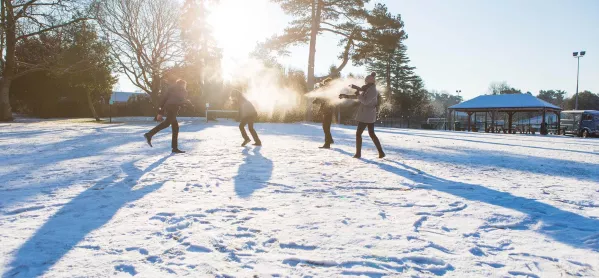What is the most tantalising phrase heard at this time of year? That’s an easy one for me. It’s when a weather forecaster mentions the "s" word but then adds “falling on higher ground”.
Oh come on, forecaster Schafernaker, you can do better than that! Why not make it fall on lower ground and give us a long-awaited “snow day”? For yes, you are personally to blame! Sometimes, shooting the messenger doesn’t seem all that unreasonable.
For similar reasons, I don’t have much time for other hopelessly half-way-house weather expressions such as “heavy frost”, “wintry showers” and the particularly loathed “sleet”.
Sleet is as dismal and disappointing as it sounds. It is the weather’s equivalent of a bright, irritating and constantly under-performing pupil. In fact, I had a quiet word with young Sleet on my way home from a January parents’ evening recently, given that he was spitting at my windscreen again and given that I was still in parents’ evening autopilot mode:
“Sleet, you could be as wonderful as your close friend Snow if you just put a couple of degrees more effort in. But, instead, you’re wasting everyone’s time. Make a proper effort to be like Snow or don’t bother at all.”
For some colleagues I have known, snow days have turned out to be more than just a day off school. The snow has sometimes proved to be a key Sliding Doors factor in the lives of several friends and colleagues. I have known entire lives change because of that random two-degree drop in temperature and the knock-on effects of the subsequent school closure.
Two former colleagues, for instance – one taught chemistry and the other languages – separately arrived in school one snowy morning having missed the message that the school was closed for the day. They found themselves trapped there as the weather significantly deteriorated into a storm and delayed their journeys home.
Snow day romance
Virtual strangers beforehand, this combination of events meant that they had the unique opportunity to chat together alone in the staffroom all day and found out that they liked each other very much. They then walked miles through the snow to where one of them lived and had dinner and wine by the fireside. They were married the following year. Pure meteorological chance. If the temperature had been a degree or two higher and the school had stayed open, it’s very questionable whether they would have ever been thrown together in such a way.
I could offer you a couple of other similar snow-day love-matches, though sometimes the snow fates throw up a rather less romantic sequence of events. On another snow day, a noble colleague dutifully went to offer his professional skills at the nearest (open) primary school to where he lived – as advised by his county council employers.
After he had politely asked a pupil the whereabouts of school reception, a suspicious parent got on the phone and the head rather apologetically told him that the police were on their way. Just think. If the weather had been two degrees warmer and his own school open, he would have never have had the chance to be interrogated in a police car. He sees the world differently now.
Admittedly, snow days are not always so full of drama. Most of us simply spend the day marking – a rare chance to catch up. Yet there is no doubt that the arrival of snow – with its glorious transformation of the landscape, its immediate smothering and silencing of timetables and bells, and its opportunity to become 12 again and lob snowballs – still stirs something reassuringly non-institutional and youthful within. If that makes me “snowflake generation” (far worse a phrase than “falling on higher ground", come to think), then I am proud of it.
Stephen Petty is head of humanities at Lord Williams’s School in Thame, Oxfordshire





